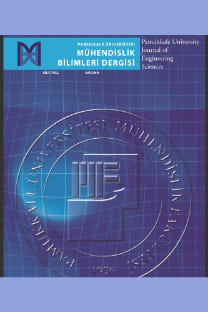MongoDB'nin tam metin arama performansını iyileştirme yöntemi
NoSQL, MongoDB, Metin dizini, Tam metin arama, MWCA
A method to improve full-text search performance of MongoDB
NoSQL, MongoDB, Text index, Full-Text search, MWCA,
___
- [1] Qiao Y. An FPGA-Based Snappy Decompressor-Filter. MSc Thesis, Delft University of Technology, Delft, Netherlands, 2018.
- [2] Deutsch P, Gailly JL. “Zlib compressed data format specification version 3.3”. RFC 1950, USA, 1996.
- [3] Collet Y, Kucherawy M. “Zstandard compression and the application/zstd Media Type”. RFC 8478, USA, 2018.
- [4] Öztürk E, Mesut A, Diri B. “Multi-Stream word-based compression algorithm for compressed text search”. Arabian Journal of Science and Engineering, 43(12), 8209–8221, 2018.
- [5] Habib A, Islam MJ, Rahman MS. “A dictionary-based text compression technique using quaternary code”. Iran Journal of Computer Science, 3(3), 127–136, 2020.
- [6] Rahman MA, Hamada M. “Burrows–Wheeler transform based lossless text compression using keys and huffman coding”. Symmetry, 12(10), 1654-1667, 2020.
- [7] Mahmood MA, Hasan KMA. “Efficient compression scheme for large natural text using zipf distribution”. International Conference on Advances in Science, Engineering and Robotics Technology, Dhaka, Bangladesh, 3 May 2019.
- [8] Bharathi K, Kumar H, Fairouz A, Al Kawam A, Khatri SP. “A plain-text incremental compression (pic) technique with fast lookup ability”. IEEE 36th International Conference on Computer Design, Orlando, FL, USA, 7-10 October 2018.
- [9] Buluş HN, Carus A, Mesut A. “A new word-based compression model allowing compressed pattern matching”. Turkish Journal of Electrical Engineering & Computer Sciences, 25(5), 3607–3622, 2017.
- [10] Morishima S, Matsutani H. “Performance evaluations of document-oriented databases using GPU and cache structure”. IEEE Trustcom/BigDataSE/ISPA, Helsinki, Finland, 20-22 August 2015.
- [11] Kelec A, Dujlovic I, Obradovic N. “One approach for fulltext search of files in MongoDB based systems”. IEEE 18th International Symposium INFOTEH-JAHORINA, East Sarajevo, Bosnia & Herzegovina, 20-22 March 2019.
- [12] Truica CO, Boicea A, Radulescu F. “Building an inverted index at the dbms layer for fast full text search”. Journal of Control Engineering and Applied Informatics, 19(1), 94-101, 2017.
- [13] Zobel J, Moffat A. “Inverted files for text search engines”. ACM computing surveys (CSUR), 38(2), 1-56, 2006.
- [14] Greca S, Kosta A, Maxhelaku S. “optimizing data retrieval by using mongodb with elasticsearch”. International Conference on Recent Trends and Applications in Computer Science and Information Technology, Tirana, Albania, 23-24 November 2018.
- [15] Han L, Zhu L. “Design and implementation of elasticsearch for media data”. IEEE International Conference on Computer Engineering and Application, Guangzhou, China, 18-20 March 2020.
- [16] Lu W, Zhu L, Duan S. “Research and implementation of big data system of social media”. IEEE/ACIS 17th International Conference on Computer and Information Science, Singapore, 6-8 June 2018.
- [17] Mongodb, Inc. "Getting started with MongoDB Atlas FullText Search". https://www.mongodb.com/blog/post/ getting-started-with-mongodb-atlas-fulltext-search (10.07.2021).
- [18] Eyada MM, Saber W, El Genidy MM, Amer F. “Performance evaluation of iot data management using mongodb versus MySQL databases in different cloud environments”. IEEE Access, 8, 110656-110668, 2020.
- [19] Mehmood E, Anees T. “Performance analysis of not only SQL semi-stream join using MongoDB for real-time data warehousing”. IEEE Access, 7, 134215-134225, 2019.
- [20] Nurseitov N, Paulson M, Reynolds R, Izurieta C. “Comparison of JSON and XML data interchange formats: a case study”. 22nd International Conference on Computer Applications in Industry and Engineering; San Francisco, CA, USA, 4-6 November 2009.
- [21] Deutsch P. “DEFLATE Compressed Data Format Specification Version 1.3”. RFC 1951, USA, 1996.
- [22] Deutsch P. “GZIP file Format Specification Version 4.3”. RFC 1952, USA, 1996.
- [23] Duda J, Tahboub K, Gadgil NJ, Delp EJ. “The use of asymmetric numeral systems as an accurate replacement for Huffman coding”. IEEE Picture Coding Symposium, Cairns, QLD, Australia, 31 May-3 June 2015.
- [24] Moffat A. “Word-based text compression”. Software: Practice and Experience, 19(2), 185-198, 1989.
- [25] Heaps HS. Information Retrieval: Computational and Theoretical Aspects. 1st ed. Sea Harbor Drive Orlando, FL, USA, Academic Press, 1978.
- [26] Alakuijala J, Farruggia A, Ferragina P, Kliuchnikov E, Obryk R, Szabadka Z, Vandevenne L. “Brotli: A general-purpose data compressor”. ACM Transactions on Information Systems, 37(1), 1-30, 2018.
- ISSN: 1300-7009
- Başlangıç: 1995
- Yayıncı: PAMUKKALE ÜNİVERSİTESİ
Göz, kaş ve baş hareketlerine dayalı bir insan-bilgisayar etkileşimi sistemi
Muhammed Oğuz TAS, Hasan Serhan YAVUZ
Hidrojen depolama sistemi için indüksiyon ısıtmalı metal hidrür tüp
Salih NACAR, Selim ÖNCÜ, Muhammet KAYFECİ
MongoDB'nin tam metin arama performansını iyileştirme yöntemi
KOAH parametrelerini ölçebilecek spirometrik bir ölçüm sisteminin tasarlanması ve gerçekleştirilmesi
Harun SÜMBÜL, Ahmet Hayrettin YÜZER
Ayrık zamanlı PI, PID ve PIR kontrolörler ile baskın kutup bölgesi atama
Ayşe DUMAN MAMMADOV, Emre DİNCEL, Mehmet Turan SÖYLEMEZ
Tanıtılmış bir hiperkaotik sistemin yeni bir analizi ve uygulamaları
Emrah TELLİ, Zehra Gülru ÇAM TAŞKIRAN
Merve APAYDIN, Mehmethan YUMUŞ, Ali DEĞİRMENCİ, Ömer KARAL
Türkiye’nin yenilenebilir enerji projeleri ile geliştirebileceği karbon sertifikası potansiyeli
Sürücü yorgunluk evrelerinin EEG işaretleri ile tespiti ve analizi
Ahmet DEMİR, Şule BEKİRYAZICI, Oğuzhan ÇOŞKUN, Recep EKEN, Güneş YILMAZ
